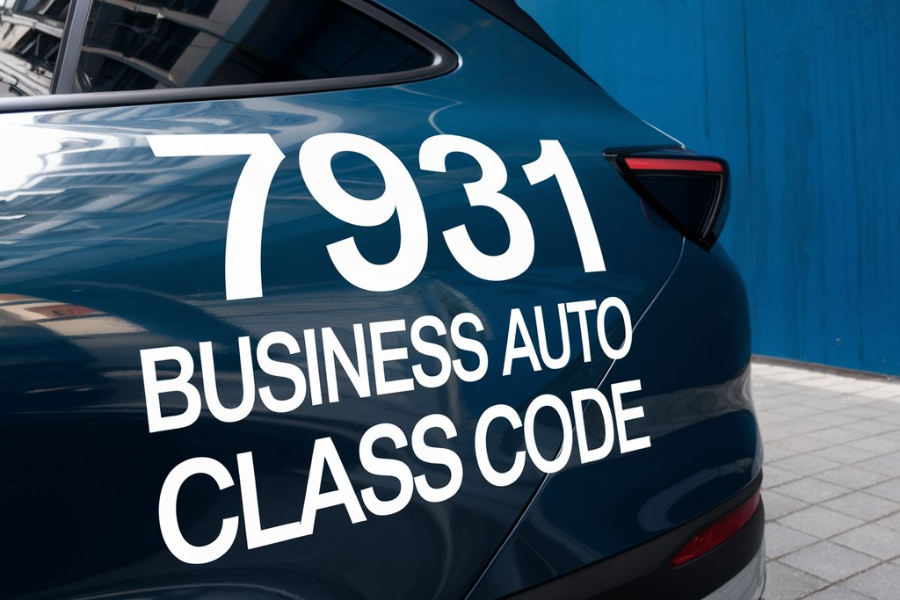The 7931 Business Auto Class Code is a critical factor for businesses that rely on vehicles for their day-to-day operations, such as delivery services, transportation of goods, or mobile services. This specific classification helps insurers determine the type of coverage your business requires and plays a major role in calculating your insurance premiums. The code is directly tied to the level of risk associated with how your business uses its vehicles. For example, companies with higher risks—such as those managing larger fleets or operating in more dangerous environments—are likely to face higher insurance costs due to this classification.
For business owners, understanding the 7931 code is key to making smarter decisions about their insurance policies. It not only helps ensure that you have the right coverage for your needs but also allows you to better manage costs. By knowing how this code works, businesses can assess their risks, adjust coverage accordingly, and potentially save on premiums while ensuring they remain protected. Whether you operate a single service vehicle or a full fleet, being informed about the 7931 Business Auto Class Code can help safeguard your business and reduce unnecessary expenses.
What Is The 7931 Business Auto Class Code?

The 7931 Business Auto Class Code is a key component of the system that insurance companies use to classify businesses based on the types of vehicles they operate and the risks associated with their use. This code specifically applies to businesses that rely heavily on commercial vehicles, such as delivery services, trucking companies, or any operation that involves transportation. It falls under the broader Standard Industrial Classification (SIC) system, which helps insurers categorize businesses based on the nature of their operations. Essentially, this classification helps insurers get a clearer picture of how your business uses vehicles, the risks involved, and what kind of coverage you’ll need.
For businesses in the transportation sector, the 7931 code is particularly important. It considers factors like the number of vehicles you operate, the distances they travel, and the types of goods being transported. These details directly influence your insurance premiums, as higher-risk operations—like those involving long-distance trucking or transporting hazardous materials—are more likely to face higher rates. On the flip side, businesses with lower risks may be able to secure more favorable insurance terms.
Understanding the 7931 Business Auto Class Code can help you make better decisions when it comes to protecting your business. By knowing how your business is classified, you can ensure that you have the right type of coverage in place while also potentially saving money by avoiding unnecessary costs. Whether you’re running a single delivery van or a large fleet of trucks, this code plays a critical role in shaping your insurance policies and the premiums you pay.
Why Is The 7931 Business Auto Class Code Matters?
Grasping the significance of the 7931 Business Auto Class Code is essential for various reasons that directly impact automobile-related businesses.
1. Accurate Risk Assessment
Insurance companies rely on the 7931 Business Auto Class Code to evaluate the risks associated with businesses operating in the automobile sector. This classification enables insurers to estimate the likelihood of claims and potential losses, which leads to more accurate premium calculations. By understanding the specific risks tied to each business, insurance providers can set premiums that genuinely reflect the business’s risk profile, ensuring fairness in pricing.
2. Customized Insurance Policies
The use of the 7931 Business Auto Class Code also facilitates the creation of tailored insurance policies that meet the distinct needs of automobile-related businesses. Instead of applying a generic policy, insurers can design coverage that specifically addresses the unique risks and requirements of each company. This customization helps ensure that businesses have the protection they need without paying for unnecessary coverage.
3. Compliance and Regulation
Accurate classification with the 7931 Business Auto Class Code is vital for ensuring compliance with industry regulations and standards. By being properly classified, businesses can meet legal requirements and avoid potential compliance issues, safeguarding their operations. This adherence to regulation not only protects the business but also enhances its credibility in the marketplace.
4. Financial Planning
Understanding how the 7931 Business Auto Class Code affects insurance premiums is crucial for effective budgeting and financial planning. By grasping its impact, businesses can better anticipate their insurance costs and manage their finances more strategically. This foresight enables them to allocate resources wisely and prepare for future expenses, ultimately leading to more informed financial decisions.
Strategies For Lowering Insurance Costs In 7931 Businesses

Business owners operating under the 7931 Business Auto Class Code have several effective strategies at their disposal to help reduce their auto insurance costs.
Implement Safety Programs
One of the most impactful steps is the development and enforcement of comprehensive safety programs. By promoting safe driving practices and establishing clear guidelines, businesses can minimize the number of accidents and claims they face. Over time, a strong safety record can lead to lower insurance premiums as insurers recognize the reduced risk associated with the business.
Regular Maintenance
Another crucial strategy is ensuring that vehicles are kept in optimal condition through regular maintenance. Proper upkeep not only prevents breakdowns but also contributes to safer driving conditions, which can significantly reduce the likelihood of accidents. Insurance providers often consider the maintenance history of a fleet when determining rates, so a well-maintained fleet can potentially lead to lower insurance costs.
Driver Training
Investing in regular training for drivers is also essential. Enhanced driver training programs can improve driving skills and increase awareness of road safety, thereby decreasing the chances of accidents. By demonstrating a commitment to driver safety, businesses can not only foster a safer work environment but may also benefit from lower insurance rates as a result of their proactive measures. Overall, these steps not only help in reducing insurance costs but also contribute to the overall efficiency and safety of the business operations.
Common Industries Under The 7931 Business Auto Class Code
The 7931 Business Auto Class Code applies to several industries that rely heavily on vehicles for their business operations. Some of the most common industries under this classification include:
Trucking and Freight: Companies that transport goods across long distances, often dealing with heavy loads and cross-country routes.
Delivery Services: Businesses that handle local deliveries, such as food delivery, courier services, or package deliveries, where vehicles are used daily to transport items to customers.
Construction Companies: Firms that operate heavy-duty vehicles, like trucks, cranes, and excavators, which are essential for moving materials and equipment to and from job sites.
Risk Factors Across Different Industries
Each industry under the 7931 code faces its own unique set of risks based on the type of vehicles used and the nature of the work. For instance, trucking companies often face higher risks due to long-distance driving, potential road hazards, and the wear and tear on vehicles. On the other hand, local delivery services might experience more frequent accidents, as drivers are constantly stopping and starting in busy urban areas, increasing the likelihood of fender benders or collisions.
In fact, statistics show that the transportation industry has a 33% higher risk of vehicle-related accidents compared to other sectors. This underscores the importance of proper classification and adequate insurance coverage to protect businesses from these heightened risks.
How The 7931 Business Auto Class Code Affects Insurance Expenses
The insurance premiums that businesses pay are heavily influenced by their assigned class code. Specifically, the 7931 Business Auto Class Code plays a critical role in shaping the cost of coverage for companies that utilize vehicles as part of their operations.
Risk-Based Premiums
For businesses classified under the 7931 code, premium rates can vary significantly based on specific risk factors associated with their operations. For instance, a company engaged in high-risk activities—such as long-haul trucking or transporting hazardous materials—will likely face higher premiums due to the increased likelihood of accidents or incidents. In contrast, a business with a lower risk profile, like a local delivery service operating in a limited area, may benefit from more favorable premium rates.
Coverage Options
In addition to influencing premiums, the 7931 Business Auto Class Code also affects the types and levels of coverage that are available. Insurance providers tailor their policies based on this classification to ensure that the coverage matches the unique needs and risks of each business. For example, businesses with a higher risk of vehicle-related incidents may need broader coverage options that include higher liability limits or specialized protections.
Moreover, a company’s claims history can further impact its insurance costs. Businesses that have filed multiple claims may find themselves facing increased premiums, as insurers view a history of claims as a sign of heightened risk. Consequently, insurance providers consider both the 7931 Business Auto Class Code and the business’s claims history to determine overall premium rates, emphasizing the importance of maintaining safe operational practices to manage costs effectively.
Ensuring Accurate Classification For Your Business
To prevent misclassification and its potential pitfalls, business owners should collaborate closely with their insurance agents. Providing comprehensive descriptions of your business activities and how your vehicles are used is essential for ensuring that your insurance classification accurately reflects your operations. Additionally, regular reviews of your insurance policies can help incorporate any new vehicles or changes in business activities, keeping your coverage aligned with your needs.
Steps to Ensure Proper Classification:
- Provide Accurate Descriptions: Clearly outline the nature of your business and the specific activities in which you engage. This includes detailing the types of vehicles used and their primary functions within your operations.
- Maintain Detailed Records: Keep thorough records of vehicle usage, including mileage, types of goods transported, and any relevant operational details. This information is vital for your insurer to assess your risk accurately.
- Update Your Insurer Regularly: Inform your insurance provider of any changes in your business operations or vehicle fleet. Whether you acquire new vehicles or alter your business model, timely communication is key to maintaining appropriate coverage.
Tip:
Conduct regular audits of your vehicle usage and business activities. This proactive approach ensures that your current classification and insurance coverage align with your ongoing operations, helping to identify any discrepancies that may need to be addressed. Regular checks can save you from unexpected issues down the line, providing peace of mind and financial protection for your business.
Advantages Of Accurate Classification For Your Business
Ensuring your business is classified under the correct business auto class code is crucial for accurately reflecting your risk level in insurance premiums. Misclassification not only risks overpaying for insurance but can also leave you inadequately covered in case of unforeseen events.
Key Benefits of Proper Classification:
- Cost Efficiency: Proper classification helps eliminate unnecessary costs that can arise from being misclassified. By aligning your premiums with your actual risk level, you can potentially save significant amounts on your insurance expenses.
- Accurate Coverage: When classified correctly, your business can receive insurance coverage that adequately protects it in the event of accidents or claims. This tailored approach ensures that you are not left exposed to financial liabilities due to gaps in coverage.
- Legal Compliance: Proper classification is essential for meeting regulatory standards. By ensuring your business is classified accurately, you can avoid potential fines or penalties associated with improper classification, safeguarding your business’s reputation and finances.
Recommendation:
To maintain proper classification under the 7931 Business Auto Class Code, it is advisable for business owners to consult with their insurance providers regularly. Regular reviews of your insurance policies can help ensure that your coverage accurately reflects any changes as your business evolves, allowing you to adapt to new risks and opportunities effectively.
Conclusion
The 7931 Business Auto Class Code is a critical classification used by insurance companies to evaluate risks associated with businesses that operate vehicles. This code helps insurers assess the nature of a business’s operations, the types of vehicles used, and the potential for claims. Industries that commonly fall under this classification include trucking and freight services, delivery companies, and construction firms, all of which rely heavily on vehicle usage for their operations.
Understanding the significance of the 7931 code is essential for accurate risk assessment, allowing insurers to calculate premiums that reflect the true risk profile of a business. Proper classification leads to customized insurance policies tailored to a business’s unique needs, ensuring adequate coverage while maintaining compliance with industry regulations. It also aids in financial planning, enabling businesses to anticipate and manage insurance costs effectively.
To benefit from accurate classification, business owners should work closely with their insurance agents, providing detailed descriptions of their operations and vehicle usage. Maintaining thorough records and regularly updating insurers on any changes is crucial to avoid misclassification. Proper classification not only helps businesses save on insurance costs but also ensures they have the protection needed in case of accidents. Regular audits of vehicle usage and operations are recommended to align insurance coverage with current business activities, safeguarding against potential financial losses.
FAQs On The 7931 Business Auto Class Code
1. What is the 7931 Business Auto Class Code?
The 7931 Business Auto Class Code is a classification used by insurance companies to assess the risk associated with businesses that operate vehicles. It falls under the Standard Industrial Classification (SIC) system, enabling insurers to evaluate the nature of a business’s operations, the vehicles used, and the potential for claims.
2. Which industries typically fall under the 7931 Business Auto Class Code?
Several industries use the 7931 Business Auto Class Code, including:
- Trucking and Freight: Companies that transport goods over long distances.
- Delivery Services: Businesses focused on delivering packages or food.
- Construction Companies: Firms using heavy-duty vehicles like trucks and cranes for their operations.
3. How does the 7931 Business Auto Class Code impact insurance premiums?
The classification significantly influences insurance premiums. Businesses under this code may face varying premium rates based on their specific risk factors. Higher-risk activities could lead to increased premiums, while lower-risk operations might benefit from reduced rates.
4. What should businesses do if they notice discrepancies in their classification?
If discrepancies arise, businesses should immediately consult with their insurance provider to address any misclassification. Regular audits of vehicle usage and operations can help identify issues before they lead to problems.
5. Why is regular communication with the insurance provider important?
Regular communication ensures that any changes in the business’s operations, such as new vehicles or shifts in services, are reflected in the insurance classification. This proactive approach helps maintain appropriate coverage and avoid potential issues in the event of a claim.
Don’t miss the latest updates and alerts visit: Buzz Slash!




